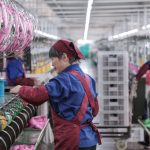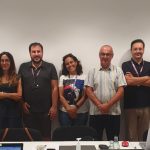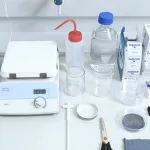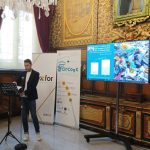Hohenstein’s new 4D body scanner will be used in a series of research projects. Each project aims to advance knowledge and processes throughout the apparel industry.
One such project, “Mobility Restrictions,” is funded by the German Federation of Industrial Research Associations (AiF). Scheduled to complete in October 2020, it will focus on body measurement changes during movement. The aim of the Hohenstein scientists is to develop a standard method of analyzing how a clothing item restricts movement.
Scanning in 4D shows body shape and size for the intended customer, and thus reveals the changes in body shape during relevant motions. It shows both the impact of movement on the garment and the garment’s impact on movement. Range of motion, particularly in sportswear and workwear, can be analyzed for improved function.

What happens to the body in motion? How do circumferential and linear dimensions as well as the surface change, e.g. by the lifting of objects?
© Hohenstein
4D data with 3D visualization shortens or eliminates prototyping time and cost. It creates better data for size chart creation and pattern making. Better patterns lead to less material and product waste. Realistic size data leads to better fitting garments. Improving fit, function and ergonomic comfort affects return rates, brand loyalty and profits.

With 4D technology, the development of new products with optimal protective function and movement comfort becomes possible. © Hohenstein
About Hohenstein
With global headquarters in Boennigheim, Germany and 1000 employees in offices and labs around the world, Hohenstein offers accredited and independent textile testing, certification, research and development as well as training since more than 70 years. Product labels such as the Hohenstein quality label or the UV Standard 801 support manufacturers and retailers in their marketing activities. As a founding member, Hohenstein is also one of the most important laboratories for testing within the OEKO-TEX® portfolio. www.hohenstein.com
The IGF project 20163 N by the research association Forschungskuratorium Textil e.V., Reinhardtstraße 12-14, 10117 Berlin, Germany, was financed through the AiF within the framework of the programme for promotion of cooperative industrial research (IGF) by the German Federal Ministry for Economic Affairs and Energy based on a resolution by the German Bundestag.





